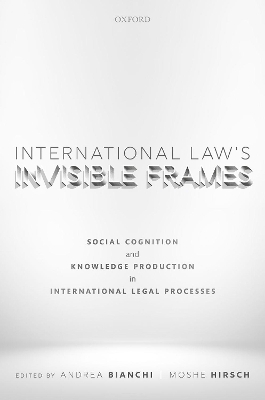
International Law's Invisible Frames
Oxford University Press (Verlag)
978-0-19-284753-9 (ISBN)
What is international law, and how does it work? This book argues that our answers to these fundamental questions are shaped by a variety of social cognition and knowledge production processes. These processes act as invisible frames, through which we understand international law. To better conceive the frames within which international law moves and performs, we must understand how psychological and socio-cultural factors affect decision-making in an international legal process. This includes identifying the groups of people and institutions that shape and alter the prevailing discourse in international law, and unearthing the hidden meaning of the various mythologies that populate and influence our normative world.
With chapters from leading experts in the discipline, employing insights from sociology, psychology, and behavioural science, this book investigates the mechanisms that allow us to apprehend and intellectually represent the social practice of international law. It unveils the hidden or unnoticed processes by which our understanding of international law is formed, and helps readers to unlearn some of the presuppositions that inform our largely unquestioned beliefs about international law.
Andrea Bianchi is Full Professor of International Law at the Graduate Institute of International and Development Studies, Geneva. Previously, he was Full Professor at the Catholic University in Milan; Associate Professor at the University of Parma, and Professorial Lecturer at the Johns Hopkins SAIS Bologna Centre. His publications address topics that range from international legal theory and treaty interpretation, human rights and international humanitarian law, terrorism and counterterrorism, to the law of jurisdiction and jurisdictional immunities, state responsibility, non-state actors, and the law of treaties. Moshe Hirsch is the Von Hofmannsthal Chair in International Law at the Hebrew University of Jerusalem. He specializes in international economic law and international legal theory, with a particular emphasis on the sociology of international law. A significant part of his work involves interdisciplinary research that employs sociological theories, game theory, political economy, and international relations theory.
Introduction
Section I. Social Cognition: Foregrounding Information Processing and Recontextualizing International Law
1: Moshe Hirsch: Social Cognitive Studies, Sociological Theory, and International Law
2: Anne van Aaken and Jan-Philip Elm: Framing in and Through Public International Law
3: Ingo Venzke: Cognitive Biases and International Law: What's the Point of Critique?
4: Jacob Livingston Slosser and5 Mikael Rask Madsen: Institutionally Embodied Law: Cognitive Linguistics and the Making of International Law
5: Tomer Broude: Prosociality, International Law, and Humanitarian Intervention
6: Jean d'Aspremont: A Worldly Law in a Legal World
7: Shiri Krebs: The Invisible Frames Affecting Wartime Investigations: Legal Epistemology, Metaphors, and Cognitive Biases
8: Margherita Melillo: Labels as the Visible Part of International Law's Invisible Frames: The Case of the Framework Convention on Tobacco Control as an 'Evidence-Based' Treaty
Section II. Making Knowledge Production Visible: Structures, Actors, and Processes
9: Andrea Bianchi: Knowledge Production in International Law: Forces and Processes
10: Akbar Rasulov: The Discipline as a Field of Struggle: The Politics and Economics of Knowledge Production in International Law
11: Jan Klabbers: Reflections on the ITU: International Organizations as Epistemic Structures
12: Harlan Grant Cohen: Metaphors of International Law
13: Matthew Windsor: Counterstorytelling in International Economic Law
14: Eyal Benvenisti and Doreen Lustig: Revisiting the Memory of Solferino: Knowledge Production and the Laws of War
15: Tamar Megiddo: Knowledge Production, Big Data, and Data-Driven Customary International Law
16: Ana Luísa Bernardino: Going by the Book - What International Law Textbooks Teach Us Not To Learn
| Erscheinungsdatum | 01.12.2021 |
|---|---|
| Verlagsort | Oxford |
| Sprache | englisch |
| Maße | 162 x 240 mm |
| Gewicht | 658 g |
| Themenwelt | Recht / Steuern ► Allgemeines / Lexika |
| Recht / Steuern ► EU / Internationales Recht | |
| Sozialwissenschaften ► Soziologie | |
| ISBN-10 | 0-19-284753-8 / 0192847538 |
| ISBN-13 | 978-0-19-284753-9 / 9780192847539 |
| Zustand | Neuware |
| Haben Sie eine Frage zum Produkt? |
aus dem Bereich


